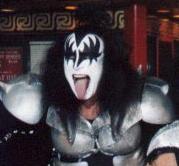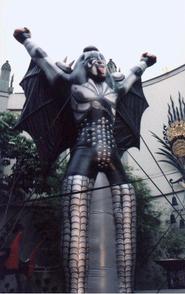|
|
|
![]()
"ROCK IS DEAD" - Gene
Simmons
Not so Fast, Gene
Commentary by
Josh "Spudbeast" Bolton
September 2014
![]()
|
Simmons is no stranger to controversy, and it seems that -- especially of late -- he has been the target of outrage, stemming from his ignorant comments regarding mental illness, suicide, and illegal immigration. But his death of rock comment has riled up the fan base of the genre, prompting "Not So Fast" responses from mega-acts like The Foo Fighters. Though a notorious rebel-rouser, letís assume that Simmons was being sincere in his comments and not simply click-baiting. Simmonsís reasoning as the why rock is dead? Itís hard to make a living off of it. Says Simmons: "I am so sad that the next 15-year-old kid in a garage someplace in St. Paul, that plugs into his Marshall and wants to turn it up to 10, will not have anywhere near the same opportunity that I did. He will most likely, no matter what he does, fail miserably." Simmons goes on to blame illegal downloading and a "lack of industry support." Is Simmons so absolutely detached from the soul of rock that he has no idea what it is anymore? Rock has never been intended to be a meal ticket. Rock is in your blood; it's something that you have to do. While Simmons's hypothetical Minnesotan teenager may never sell out Madison Square Garden, he should keep fighting on and continue to do what heís doing simply because he is compelled by the call of rock'n'roll. He may have dreams of glory, of shredding away in front of tens of thousands of people and who wouldnít? But letís say that never happens. Letís say this kid gets a band together, and they want to play a show. And the only venue in town that will let them play is a bar and theyíre not 21 yet, so they have to sneak in to set up their gear and play to a couple of professional drunks. Maybe a few friends sneak past the bouncer. Guess what? That kid would still play the show and it would undoubtedly be one the highlights of his young life. That is rock'n'roll.
Simmons continued his laments for rock, saying "It's very sad for new bands.
They just don't have a chance. Simmonsí definition of rock isnít only outdated, itís simply wrong. Rock is a warm twelve pack of cheap beer. Rock has spent a night or two sleeping under the overpass. Rock is two haircuts and a clean shave behind. Rock is sharing a stale roach between four friends. The real, dirty roots of rock are far and away from the images of glamour and overabundance. Rock was never inherently about these things; it just became mutated by popularity, a mutation that Simmons himself has apparently undergone. Considering Simmonsís perception and definition of rock'n'roll, he is absolutely correct that rock is dead. It is no longer giant stages, spandex costumes, and walls of fireworks. Itís dirty, it's nicotine-stained, and it's usually drunk. Rock has slowly began to cycle back to its beginning incarnations: Riff-heavy groups that play in shadowy dive bars, heralded by such groups as Oaklandís Lecherous Gaze. Rock has been taken back by the outcasts and delinquents who have shunned the shiny plastic product that rock had transformed into. Simmonsís misconception isnít limited only to current rock culture, but to current technology. Never before in the history of rock has it been easier to record, produce, and distribute music. This outlet allows bands today to access audiences on a literally global scale. Outlets such as Pandora and Spotify are constantly introducing countless numbers of music fans to new groups and new acts, and the resurgence of vinyl is undoubtedly the result of loyal rock fans.
Simmons finishes his interview with a statement Iím sure he wanted to sound ominous: "The death of rock was not a natural death. Rock did not die of old
age. It was murdered.Ē His definition of rock was murdered by itself, in a
self-cannibalizing cycle that resulted in rock becoming novelty rather than
something much bigger. The days of excess may be gone in rock'n'roll (for now,
at least) but one thing is certain: it is still very much alive. And as long as thereís
someone in a garage somewhere throwing together chord progressions, it will
always be alive. |
|
Photos by Lou Moreau |


 "Rock is dead," proclaimed KISS legend Gene Simmons, and
the music world paused. The bassist and shot-caller for one of rock'n'roll's biggest
and most recognizable franchises just made a statement that could mean him
hanging up his four-string for good (though that would mean lost revenue for
Simmons, and thus is probably unlikely.) If you ask me, however, with that
comment,
Simmons is little more than a glorified troll.
"Rock is dead," proclaimed KISS legend Gene Simmons, and
the music world paused. The bassist and shot-caller for one of rock'n'roll's biggest
and most recognizable franchises just made a statement that could mean him
hanging up his four-string for good (though that would mean lost revenue for
Simmons, and thus is probably unlikely.) If you ask me, however, with that
comment,
Simmons is little more than a glorified troll.  You're better off not even learning
how to play guitar or write songs." Adding, "Today's songwriters and creators are more
likely to work behind the scenes than practicing and testing their material out
on stage." Here, we have Simmons judging new bands from his perspective
as someone who has already made it. He is implying rock is dead simply because bands
probably won't achieve the success (read: excess) of KISS in todayís music
climate. Simmons' approach shows exactly how far he has migrated from the true pulse
of rock. Rock was never about excess; its popularity made it a successful
channel for excess, but it wasnít founded on the dreams of forty-car garages and
snorting rails of uncut cocaine off silicone-engorged tits.
You're better off not even learning
how to play guitar or write songs." Adding, "Today's songwriters and creators are more
likely to work behind the scenes than practicing and testing their material out
on stage." Here, we have Simmons judging new bands from his perspective
as someone who has already made it. He is implying rock is dead simply because bands
probably won't achieve the success (read: excess) of KISS in todayís music
climate. Simmons' approach shows exactly how far he has migrated from the true pulse
of rock. Rock was never about excess; its popularity made it a successful
channel for excess, but it wasnít founded on the dreams of forty-car garages and
snorting rails of uncut cocaine off silicone-engorged tits.